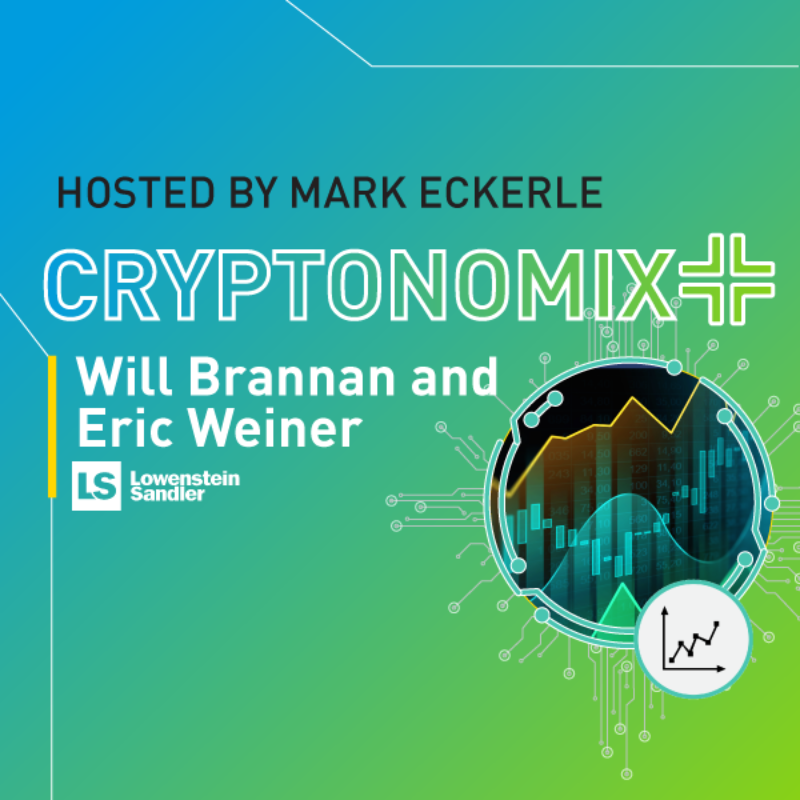Transcript:
This podcast was transcribed through a third-party application. Please disregard any misrepresentations.
Mark Eckerle:
Hello, listeners, welcome to this episode of Cryptonomix. Before we jump into today's discussion, please keep in mind this recording is for general education and is not intended to constitute investment advice. Any opinions expressed are those of the participants and do not necessarily represent those of Withum. Hello listeners, and welcome back to this episode of Cryptonomix, brought to you by Withum. As always, I'm your host, Mark Eckerle, and today's episode is a new featured segment where we briefly recap the major highlights and events from last month that impacted the digital asset and blockchain community. Our goal is to provide context on a few of the events that transpired that we believe had the largest impact on all things digital assets. First major headline for July, 2023 was XRP declared not a security. The SEC charged Ripple the company with conducting an unregistered security offering for the XRP token In December, 2020.
Mark Eckerle:
After a long drawn out legal battle on July 13th, 2023, the district court ruled in a motion for summary judgment. The XRP, the token itself is not an investment contract and thus is not in and of itself. Security Ripple's programmatic sales of XRP did not violate securities laws. These sales were made by Ripple on crypto exchanges where the buyer did not know who they were buying from and could not know they were investing in a common enterprise. Ripple's institutional sales of XRP did however violate securities laws. These sales were made directly to institutions where the buyer knew they were investing in Ripple. The XRP token has a total supply of 100 billion. Created at inception when the XRP ledger was launched in 2012. Of their original 100 billion XRP 80 billion was given to ripple the company for them to continue contributing code and services to the ledger.
Mark Eckerle:
And the remaining 20 billion was given to the three co-founders with various lockup agreements. The sales in question in the SEC case referred to the sales made from the 80 billion XRP allocated to Ripple the company, the SEC will likely appeal in the second circuit court where there's a chance the positive rulings shared could be overturned. All that said, please check out our featured episode discussing all the details of the Ripple case much more where I was joined by Eric Weiner and Will Brannan from Lowenstein Sandler's Crypto Practice. Our second highlight of the month was World Coin Token Launch. World Coin's. WLD. Token made its debut on July 24th, co-founded by Sam Altman, the founder of OpenAI. The World Coin Initiative seeks to verify whether an online entity is human or not employing a unique biometric identification approach to achieve its objective.
Mark Eckerle:
World Coin uses a hardware device shaped like an orb, which scans users' eyes to verify their human identities. Participants have the option to store either a hash of their I data or the raw data itself, providing some flexibility in privacy as a reward for early adopters. The project distributed 25 WLD tokens to users through an airdrop valued at approximately $55 per token. Based on then current market prices, however, the project has drawn both attention and criticism. These concerns include privacy, centralization, security, and accessibility. All in all world coins launch represent a groundbreaking endeavor to solve the complex problem of digital human identity verification. While the concerns and risks outlined by experts in the community should not be overlooked, they do not necessarily foretell failure for the project. World Coin's main developer Tools for Humanity plans to deploy orbs in over 35 cities across 20 countries to accelerate user signups and increase the number of orbs from 200 to around 1500 by the end of the year.
Mark Eckerle:
Our third major highlight the Bitcoin ETF race. The SEC accepts spot accepted spot, Bitcoin ETF proposals for review the SEC accepted applications to create SPOT Bitcoin ETFs for review. The first step in the agency's process for deciding whether or not to approve the latest round of applications. The proposals for BlackRock, Valkyrie, VanEck, WisdomTree, Fidelity, and Invesco appeared on the federal registrar. In a report published by Bitcoin Company NYDIG, they think the spot based Bitcoin ETF could bring $30 billion in new demand for the asset. BlackRock's. CEO Larry Fink went on Fox Business and said Bitcoin could quote revolutionize finance. He added quote, instead of investing in gold as a hedge against in inflation, a hedge against the onerous problems of any one country or the devaluation of your currency, whatever country you're in. Let's be clear, Bitcoin is an international asset.
Mark Eckerle:
It's not based on any one currency, and so it can represent an asset that people can play as an alternative end quote our fourth major headline. In addition to the Bitcoin ETF news, the SEC also said they are beginning to accept proposals for an Ether Futures. ETF and six firms immediately submitted applications in the following order. Volatility shares Ether Strategy. ETF was the first on July 28th, and then shortly after Bitwise, VanEck, Roundhill Pro shares and Grayscale all submitted theirs. Our fifth major headline, according to a ruling from the US District Court of Northern California Crypto Exchange, Kraken must provide a wide variety of information about its users to the IRS, which said it needed that information to see if any of Krakens users had under-reported their taxes. The IRS filed a petition in the Northern District of California in February right after the exchange settled charges with the SEC over its staking service.
Mark Eckerle:
The IRS alleged it had issued a summons to Kraken in 2021 that the exchange failed to comply with and was trying to check for tax liabilities for users who transacted crypto. Between 2016 and 2020, the company will need to produce full documentation for any Kraken user that bought, sold, or traded at least two $20,000 worth of cryptocurrency between 2016 and 2020. Full documentation includes name, taxpayer ID number, physical address, phone number, email address, and transaction ledger. Our sixth major headline of the month, Bitcoin ATM company Bitcoin Depot, launches on NASDAQ. The Bitcoin ATM provider is the first publicly listed company of its kind in the United States. The company went public via SPAC and will trade under the ticker symbol BTM. Bitcoin Depot is the biggest crypto automated teller machine operator in the northern American region with over 6,400 kiosk locations.
Mark Eckerle:
With the new NASDAQ listing, the company continues to be a leader in the Bitcoin ATM space as the first company to get listed publicly. Our seventh major headline, there were a number of crypto focused venture capital firms raising money for new funds. Two notably were Coin Fund who raised $158 million to boost early stage crypto and AI startups and Polychain Capital who raised 200 million for its fourth fund. Polychain Capital has raised 200 million and expects to raise another 200 million for a total fund size of 400. Additionally, a few major rounds of financing this month were closed. Ripple Labs backed a $54 million round for futureverse. Futureverse is a startup out of 11 different companies and they've raised $54 million in a series A round led by 10T Holdings and Ripple Labs. Company's aim is to combine AI and blockchain to build the infrastructure for users experience of the Metaverse RSIC Zero raised $40 million. They are a creator of infrastructure that helps developers build zero knowledge proof software. In a series A round led by Blockchain Capital, this follows a 12 million August, 2022 seed round led by Bain Capital.
Mark Eckerle:
Our last three headlines are predominantly on the regulatory front. Number eight, US Stablecoin Bill took a big step forward despite fight from Congress recently being advanced by the US House Financial Services Committee, the bill would have the United States Federal Reserve write requirements for issuing stable coins while preserving the authority of state regulators. It was previously modified to address concerns from some Democrats that stablecoin issuers could evade stricter oversight by opting to be regulated under a state regime. Our ninth major headline, the Clarity for Payment Stable Coins Act, was introduced by Chairman Patrick McHenry last week, marking the latest in a long series of stablecoin legislation, drafts he's had in his hand since last year, and it seeks to finally offer regulatory framework for crypto tied to the value of fiat currency. This act would help provide a path for approving and regulating stablecoin issuers while ensuring robust protections for consumers through necessary federal guardrails.
Mark Eckerle:
Stablecoins are a core element of the crypto markets providing steady tokens, with which investors can trade in and out of more volatile assets. And finally, our 10th major headline also on the regulatory front Keep Your Coins Act was introduced by Representative Warren Davidson and seeks to protect the ability of in individuals to self custody their cryptocurrency assets. This addresses one of the key risks identified by the FTX failure. This is a key tenet of blockchain technology because it allows consumers to avoid the risks associated with centralized third party custody. Thank you to everyone for listening. These are the 10 major highlights for the month of July. If you want to learn more about Rhythm's Digital Asset Practice, please visit our [email protected]. That's W I T H U m.com. Thanks everyone and have a great day. All views expressed in this podcast by Mark Eckley or his guests are solely their opinions and do not reflect the opinion of rhythm. This podcast is for informational purposes only.




